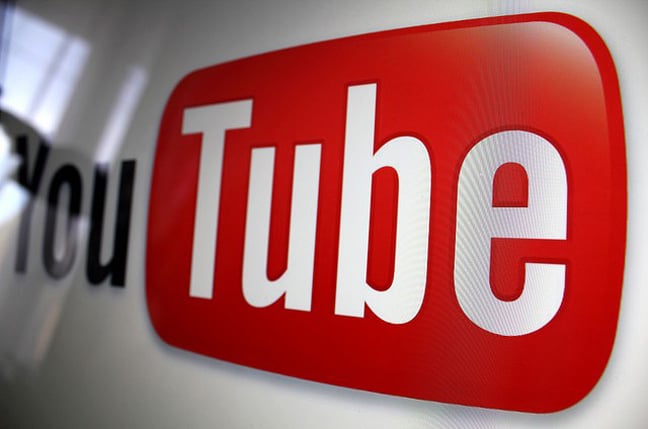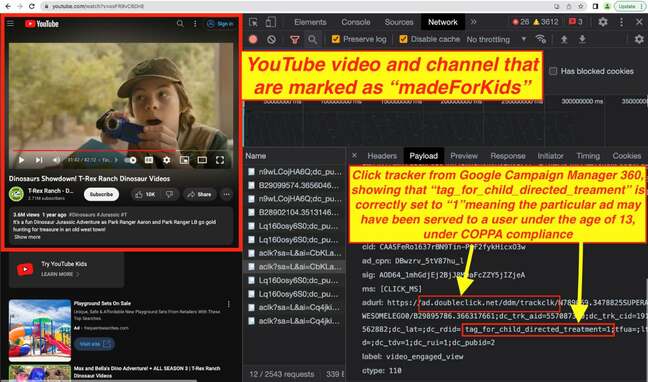YouTube Accused Of Aiming Ads At Kids After Promising It Wouldn't Do That

YouTube has allegedly been tracking children online and targeting them with personalized ads, potentially in violation of its agreement with the FTC and of the US Children's Online Privacy Protection Act (COPPA), according to a report released on Thursday.
Google, which was sued in June for allegedly invading children's privacy in Android apps through its Designed For Families program, insists its YouTube service has not broken the law nor its own policies on advertising to children. And the web giant challenged the report as misleading.
Ad metrics firm Adalytics claims that despite YouTube's September 4, 2019 consent decree with the FTC to stop targeting kids with ads and CEO Susan Wojcicki's commitment that day to "stop serving personalized ads" in "made for kids" videos, the online video giant continues to serve targeted adverts to minors.
The Adalytics alleges that YouTube appears to set long-lasting cookies specifically for ad targeting and tracking in the browsers of users who are watching YouTube videos labeled "for kids." It also suggested the video-streaming titan serves "behaviorally and demographically targeted ads on YouTube videos that are clearly labeled as 'for kids.'"
And, it claims, YouTube's mobile app for iOS "sets and shares a unique ad tracking ID every time a viewer on a 'for kids' channel clicks on a YouTube ad."
In addition, the report claims, clicking on an ad adjacent to a "for kids" video in the app leads YouTube to open an advertiser's website "in a special in-app 'webview' browser, where Google both sets various ad targeting and tracker IDs on the viewer’s iPhone, and the YouTube app allows other data brokers and ad personalization vendors to gather and share unique identifiers on the viewer."

Labeled screenshot of YouTube ad network traffic, taken from the Adalytics report ... Click to enlarge
The report identifies 313 brands with ads for consumer products aimed at adults (eg, cars, razors, etc) that appeared on YouTube videos marked "for kids" when there was no signed-in user.
A 'misleading report' Google claims
In a statement to The Register, a Google spokesperson said, "There is no evidence that Google and YouTube violated their 2019 agreement with the FTC."
"This is the second time in recent weeks that Adalytics has published a deeply flawed and misleading report," Google's person claimed. "Personalized advertising has never been allowed on YouTube Kids, and in January 2020 we expanded this to anyone watching 'made for kids' content on YouTube, regardless of their age.
"The report makes completely false claims and draws uninformed conclusions based solely on the presence of cookies, which are widely used in these contexts for the purposes of fraud detection and frequency capping — both of which are permitted under COPPA. The portions of this report that were shared with us didn’t identify a single example of these policies being violated."
The report begins with a disclaimer that says it's not offering any legal opinion. Rather, it flags client-side identifiers – eg, those contained in cookies – that play a role in advertising. How these identifiers get used is central to the claims made by Adalytics. If YouTube is in fact setting unique identifiers that can be used to track kids online, and is doing so without parental consent, that's potentially a violation of COPPA.
- Google accused of urging Android devs to mislabel apps to get forbidden kids ad data
- Google wants to target you – yes, YOU – with AI-generated ads
- Social media may harm kids. US Surgeon General says so
- Utah outlaws kids' social media addiction, sets digital curfew
Paul Lekas, head of global public policy at the Software and Information Industry Association, a trade group that counts Google as a member, told The Register that the presence of cookies – allowed under COPPA for certain uses – does not mean anything unlawful has occurred.
"Under COPPA, it is appropriate for there to be cookies on kid-oriented sites," he said. "There are some limitations and from what I've seen, it's not clear that [Adalytics has] shown that there's been any conduct or evidence that has actually gone beyond those limitations."
Google insists that cookies used with "made for kids" content are used for permissible purposes such as measurement, fraud prevention, and frequency capping – ensuring things like individual ads aren't shown too many times to someone.
Nonetheless, two US Senators – Edward J. Markey (D-MA) and Senator Marsha Blackburn (R-TN) – found the allegations sufficiently alarming to ask FTC Chair Lina Khan see whether Adalytics' findings can be substantiated.
"YouTube and Google cannot continue treating young people’s data as an unprotected commodity from which to profit with abandon," the lawmakers said in a letter to the FTC Chair.
"Not only must the FTC Act, but Congress must also pass legislation to protect young people’s privacy online and finally ban targeted advertising to kids and teens." ®
From Chip War To Cloud War: The Next Frontier In Global Tech Competition
The global chip war, characterized by intense competition among nations and corporations for supremacy in semiconductor ... Read more
The High Stakes Of Tech Regulation: Security Risks And Market Dynamics
The influence of tech giants in the global economy continues to grow, raising crucial questions about how to balance sec... Read more
The Tyranny Of Instagram Interiors: Why It's Time To Break Free From Algorithm-Driven Aesthetics
Instagram has become a dominant force in shaping interior design trends, offering a seemingly endless stream of inspirat... Read more
The Data Crunch In AI: Strategies For Sustainability
Exploring solutions to the imminent exhaustion of internet data for AI training.As the artificial intelligence (AI) indu... Read more
Google Abandons Four-Year Effort To Remove Cookies From Chrome Browser
After four years of dedicated effort, Google has decided to abandon its plan to remove third-party cookies from its Chro... Read more
LinkedIn Embraces AI And Gamification To Drive User Engagement And Revenue
In an effort to tackle slowing revenue growth and enhance user engagement, LinkedIn is turning to artificial intelligenc... Read more

